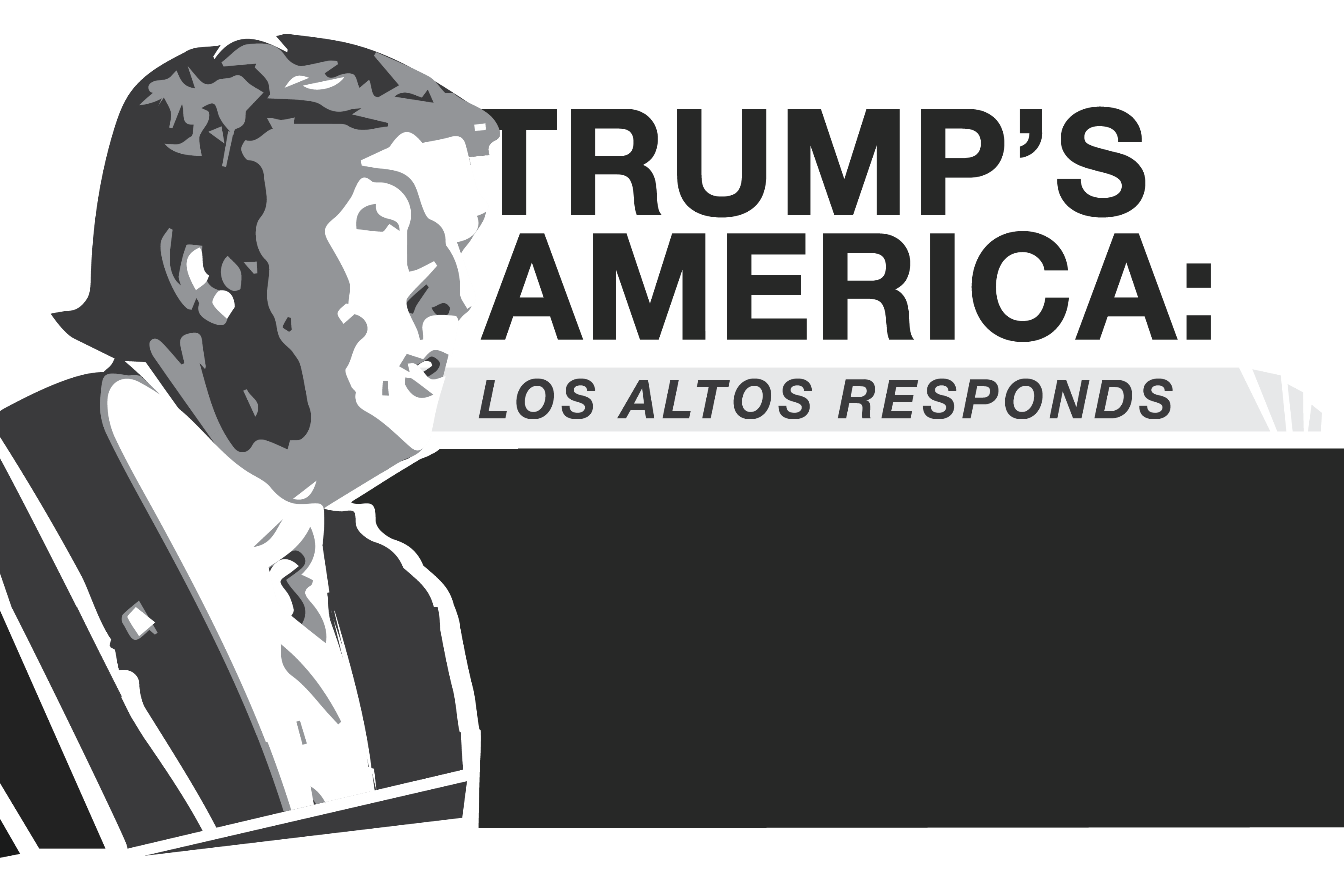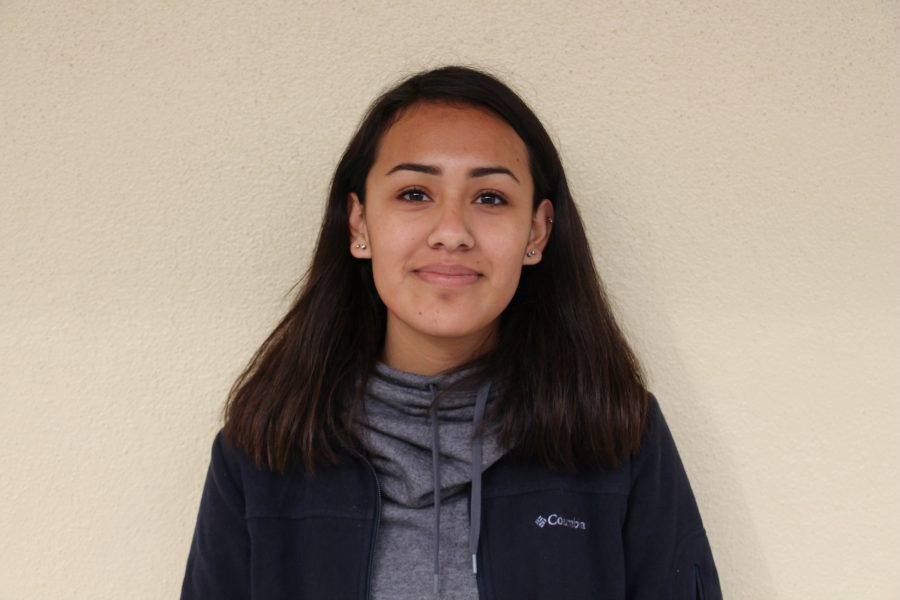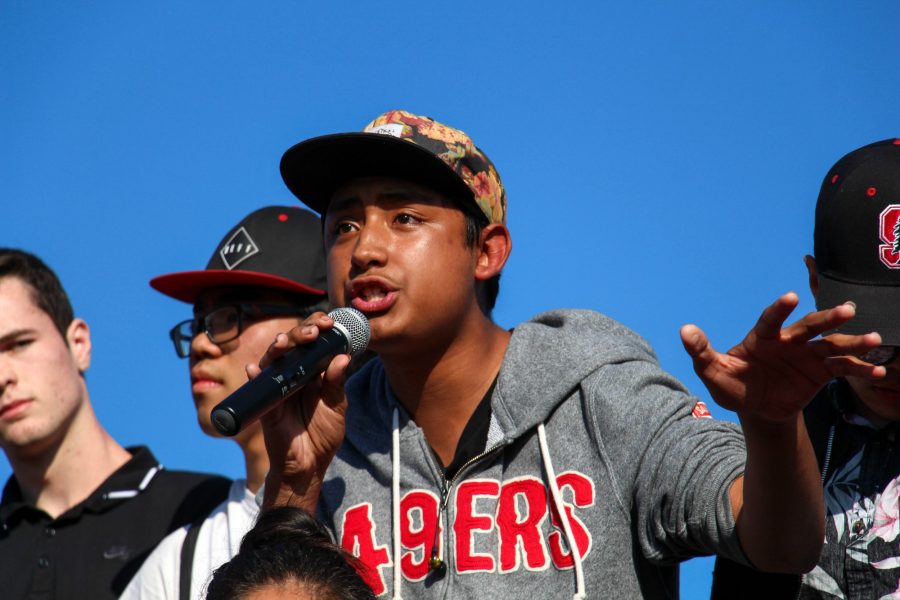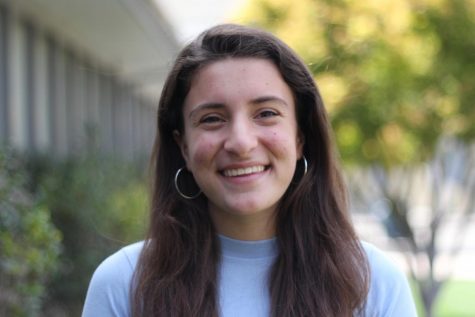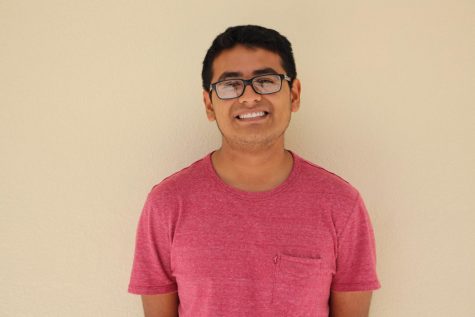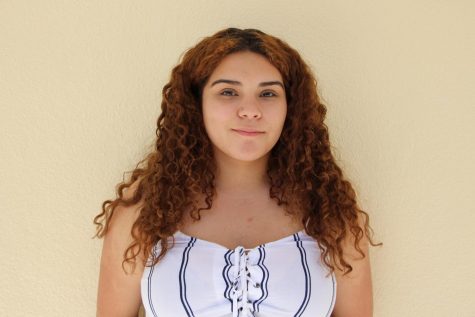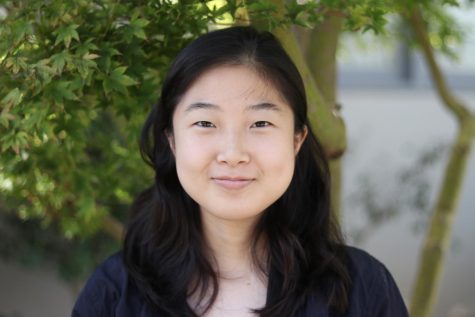Trump’s America: Los Altos Responds
December 15, 2016
Donald Trump won.
It’s a reality that many thought unfathomable — a nightmare for some and a dream come true for others. Millions across the nation mourn or celebrate the result, and calls for impeachment and secession jostle with cheers of “make America great again.”
With over 2000 students representing a variety of backgrounds, races and political standings, Los Altos is a melting pot of emotions. Many students feel uncertain about the country’s future as Trump’s rhetoric targets their upbringing and family. Others feel powerless in the face of possible deportation and xenophobia. Victorious Trump supporters feel a sense of pride, yet they hesitate to express their views under fear of judgment.
The Talon explores the outcome of the election through the eyes of Trump supporters and ardent protesters.
Trump Supporters on Campus: A Political Minority
After the election, hundreds of students participated in a campus-wide walkout in protest of Donald Trump’s impending presidency, while countless others took to social media to express their frustrations. Amidst the turmoil, the voice of one group on campus remained mostly unnoticed: students who put their support behind Trump.
Senior Johnson Wang
Not all Trump-supporters at Los Altos are die-hard followers. Some of them have been reluctant to favor Trump, describing him as a lesser of two evils. Although backing Trump may not be the easiest decision, senior Johnson Wang, who describes himself a moderate, said what he saw on the other side of the playing field made it easier.
“I’m just saying [Trump] is the better option of the two,” Johnson said. “[Hillary Clinton] is the most corrupt woman to actually run for the presidency.”
Johnson immigrated from China when he was 6 years old. He speaks of corruption in the Chinese government and views Clinton as an extension of the political climate of his homeland. He admits Trump has also been surrounded by scandals but believes Clinton’s faults make her more unqualified to be president.
“There’s so much more [that Clinton] is hiding [in her emails], and it’s crucial information,” Johnson said. “Trump has done bad things, and it’s a lose-lose situation. But to compare them both, Clinton has been involved in so many more scandals than Trump.”
Furthermore, Johnson believes that Trump’s remarks concerning women do not make him unfit to be president, dismissing them as less meaningful than many have made them out to be.
“Words don’t define who he is as a president,” Johnson said. “Until he does something that’s actually sexist, what he says doesn’t really affect me. Actions define who you are, not words.”
Johnson also defends Trump’s stance on Muslim immigration, and he claims it is based more on national safety than on a desire to persecute others for their religion. Although he acknowledges the possibility of potential ISIS terrorist threats within refugee groups is low, he fears that it will grow over time.
“Even though it’s not a problem right now, what if it is a problem in the near future?” Johnson said. “You’re more scared of something that you don’t know than something that you definitely know. The unknown of how strong they are and how they can infiltrate the U.S., really speaks to people who are scared in this country.”
Johnson expressed that he would not shy from his opinions but would remain cautious when interacting with his fellow students.
“I’m worried about the consequences,” Johnson said. “I explain to [people] my political views, but there are some who will criticize you and call you dumb, [and say] that your opinion doesn’t matter and to shut up. But you can’t get dumber from talking to other people. You can only learn.”
Senior Ezer Zuniga
As a conservative, senior Ezer Zuniga aligns many of his political views with Trump. Unlike many conservatives, however, Ezer is Latino, although he primarily identifies as an American.
“I would say I’m an American,” Ezer said. “Originally, I was a Mexican-American. I was born here. I think that using all these terms [like Mexican-American] makes sense, but at the same time these [racially descriptive terms] divide us, and I think that we have become too divided at this point.”
Much of Ezer’s support hinges on Trump’s proposed solution to illegal immigration, which he views as a growing issue in the U.S.
“You have to increase border security, which is why I was in favor of building a wall,” Ezer said. “Once you build a wall, you figure out what you’re going to do with the 11 million illegal immigrants that we have… [Especially] if you have a rare incident with an illegal immigrant doing the wrong thing, you have to do the proper thing, [and] that would be to send them back to deportment.”
Although the rights of LGBTQ+ people have become a source of concern amongst many after Trump’s election, Ezer says this concern is unfounded.
“Trump already said we’re not going to do anything about [gay marriage], so that’s set in stone,” Ezer said. “I really don’t have a problem with it. If people want to have certain lifestyles they should be able to.”
Although Ezer is not opposed to gay marriage, as a Christian, he is concerned about what he perceives to be a growing restriction on religious freedoms. He alleges the existence of a “gay lobby” that he believes is exerting undue influence over the government.
“What I really don’t like is that the gay lobby has become increasingly powerful, and they’re using the government to infringe upon freedom of religion,” Ezer said. “I’m perfectly okay with gay marriage as long as it does not infringe upon my freedoms.”
Ezer also follows the “alt-right,” a movement defined by the Associated Press as a “mix of racism, white nationalism and populism” that has risen to prominence as a result of Trump’s popularity.
The alt-right has frequently come under criticism for some of the ideas, outlets and people that have claimed ties to it. The controversial Breitbart News and white nationalist Richard Spencer are among those that have called themselves “alt-right.” However, Ezer says this portrayal is unfair, and he disagrees with the Associated Press’ definition.
“[The alt-right] is getting recognition for all the wrong reasons,” Ezer said. “There’s a difference between the alt-right and white supremacists… The whole goal [of the alt-right] is to be as outrageous as possible to shock the people who push for this liberal [political correctness] culture, where people are outraged by pretty much everything.”
Ezer acknowledges that his beliefs may not be overly popular in Los Altos. He is not overt about his political leanings and is not as vocal as some of his counterparts. However, he still views his uncommon opinions as a source of pride and would not allow his surroundings to prevent him from believing in them.
“I don’t think a lot of people know that I’m a conservative,” Ezer said. “It does get a little bit uncomfortable to be surrounded by a lot of people who think that the people who you support are racist and bigoted. Being conservative in a liberal environment allows you to see how other people think. It’s a lot better than being liberal in a liberal environment and just being in your own bubble.”
An Uncertain Future for Undocumented Immigrants
As an undocumented immigrant, junior Cinthya Fuentes’ future is uncertain. The program Deferred Action for Child Arrivals, which provides Cinthya deferred action from deportation, may be under threat with a Trump administration. Photo by Francesca Fallow.
For junior Cinthya Fuentes, the election of Donald Trump stimulated fears that not many students face. As an undocumented immigrant, Cinthya is at risk if Trump follows through on his threats to minorities. Trump has established that he wants to repeal certain policies and services that aid undocumented immigrants who are pursuing continued residence in the U.S.
For Cinthya and other undocumented students, Trump’s attacks on the Deferred Action for Child Arrivals (DACA) policy have stirred uncertainty and concern, as they rely on DACA for protection. DACA gives undocumented immigrants a two-year renewal period of deferred action from deportation and eligibility to receive a work permit.
“I’m really afraid for my future, because when I had DACA, I felt safe, I felt like I had somewhere to go after high school,” Cinthya said. “But now I’m not so sure of what [to do] anymore.”
Co-founder and executive director of Educators for Fair Consideration (E4FC), an organization that helps undocumented students fulfill their education, Katharine Gin believes that DACA will soon be repealed but is unsure as to when the repeal will happen.
“We do not know when or how the Trump administration will end the DACA program,” Gin said in an email posted online. “It could end the program effective immediately and instantly revoke work permits, or it could allow current DACA recipients to keep their work permits until they expire but not renew them.”
Despite the fears Trump’s presidency brings, Cinthya chooses not to let the results bring her down and continues to see life optimistically. On Tuesday, November, 14, Cinthya participated in Los Altos’ walkout to make her voice heard and find a sense of support in the community.
“I think the school has been really supportive, especially all my teachers,” Cinthya said. “[AVID teacher Aranxta Arriada], my fifth period teacher, literally told me, ‘Go Cinthya! Fight for your rights.’ I have so much support — I have her, my family, my parents. I have all my friends who are supporting me.”
Feeling secure with the support of the community, Cinthya does not want to be viewed as helpless or as just a statistic. Despite the future’s uncertainty, Cinthya plans to attend a university and attain a college degree, and her determination to achieve her goals keeps her focused.
“We are just people,” Cinthya said. “The day Trump won, I just felt like everyone was feeling pity for me, but I’m just another person like everyone else. [I] don’t wake up like, ‘Oh yeah, I’m undocumented.’ It’s just part of your life.”
Teachers at Los Altos have also made an effort to help undocumented students. Arriada has witnessed the reactions of her students to the election and tries to help maintain positivity.
“I had students that were crying,” Arriada said. “They’re scared they might lose all their protection that they currently have. What does that mean for college? Does that mean I am going to get deported? What does this mean for my family?”
Arriada informed her students of the resources available to them, including E4FC — an organization that offers alternatives to DACA. Gin recommends undocumented students to seek out other immigration services that could provide similar support to DACA.
Counselor Jacob Larin also aids families and students dealing with immigration issues. Larin believes that equal rights and protection for immigrants will remain despite Trump’s presidency.
“We are going to be helping the whole way,” Larin said. “Immigrants have been here since the beginning of this country, [and] nothing’s going to change that. Not a president, not a law, not the Supreme Court, not the Senate nor the House.”
As Trump’s inauguration day nears, Cinthya hopes others like her understand that support exists within the community.
“We’re not alone,” Cinthya said. “I felt alone for a really long time, but after seeing all these people here at the protest, I know we have a lot of support.”
Protestors Speak Out Against Trump
Junior Jesus Membrillo speaks at the Los Altos walkout that occurred on Monday November 14. Jesus promotes unity on campus and plans to organize his future around politics. Photo by Michael Sieffert.
Jesus Membrillo
Politics plays an integral role in junior Jesus Membrillo’s life and has shaped the career path he wants to pursue. He has taken the school by storm through his political activism — just a few weeks ago, he spoke at and helped lead a school protest against the election results.
Jesus’ interests in politics stemmed from his father’s involvement in the Mexican army. His father attempted to join the Navy in the U.S. but was denied due to his lack of documentation. Jesus said that his father’s experience helped ignite his passion for politics, and he feels that this discrimination against immigrants is rising once more with the election of Trump.
“We’re waiting for the history books to be titled ‘Trump’s Regime,’” Jesus said. “We can say, ‘We lived through that, and we survived,’ hopefully. It’s a game of fate, like ‘Politics 101: you tell people what they want to hear.’ That’s how somebody like him came to power.”
Jesus plans to organize his future around his passion by majoring in politics. During the protest, he shared many of his own opinions with the school, despite his lack of experience with public speaking.
“At first, I was one of many who just decided to go because why not?” Jesus said. “But when I heard people speaking up, I felt that it was my obligation to speak my mind and give out my thoughts about [Trump]. It helped build up my self-confidence [because] I was shaking a lot.”
Jesus holds strong views on the outcome of this year’s election. He believes that Trump is unfit to be president, likening him to a dictator or a con-man.
“You just can’t deny the reality we live in,” Jesus said. “We have people like [Trump] scapegoating, targeting minorities, homosexuals [and] mentally-ill people… [Trump] concludes that [minorities] are the bad people.”
Jesus felt angered over Trump’s views on minorities, especially his threats to deport Mexicans and Muslims. He denounces Trump’s stereotyping of Mexicans that portrays them as criminals.
“Donald Trump is targeting Mexicans… calling them rapists and criminals,” Jesus said. “We’ve got all of these [minorities] being targeted… He says that he’ll be the safety symbol of the American people, and that he’ll protect them from any harm.”
However, Jesus believes students should accept the outcome of the election, regardless of whether or not they agree with it. He has faith that the U.S. will be able to make it past difficult times.
“People shouldn’t be scared of the government,” Jesus said. “The government should be scared of its people. The people are the ones that give their government power, and the power that has been given to the government cannot be used against people.”
Sean Adibi
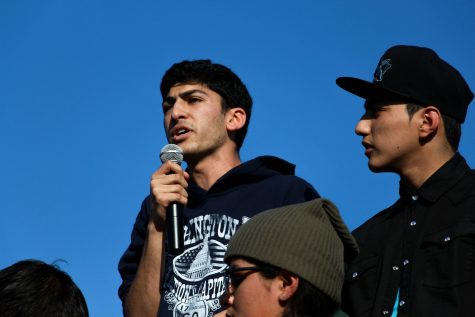
On Monday November 14, senior Sean Adibi spoke to a crowd of students involved in a walkout protesting president-elect Donald Trump. From atop the bleachers overlooking the protesters on the football field, Sean spoke words of encouragement to students at Los Altos to take a stand and unify with one another.
“If we continue to build walls between each other, it only worsens America,” Sean said at the walkout. “This country was built on the foundation that all people are equal.”
Marching down San Antonio and El Camino, Sean and over a hundred other students held signs and chanted pro-peace and anti-Trump slogans. Sean intended his speech to help ease the heated emotions that students may have been feeling. While the election of Trump shocked Sean, he believes it can be an opportunity for the Los Altos community to unite and remember to respect one another during this time.
“What I wanted to get out to the audience was not hate or anger but a message of unity, because I noticed most of the students were trying to come to terms with the results through their anger,” Sean said. “It was better for me to ask the crowd to understand and take a moment to recognize why people might be feeling certain things.”
Sean’s Middle Eastern background has influenced his viewpoint on Trump. His family immigrated to the United States before he was born, and Trump’s words about Muslim registrations and his future plans for people of various ethnic backgrounds have stricken fear and anger in Sean and his family.
The fact that Trump’s rhetoric was based on fear was very angering, especially for my family,” Sean said. “It’s really scary to think that a president can instill fear in their people.”
Sean will continue to be proactive with his political views by attending various protests in the Bay Area and possibly organizing another walkout later in the semester. He will also attend Bridge Together Golden Gate, a demonstration that will be held on the Golden Gate Bridge in San Francisco on January 20, Inauguration Day, to further protest Trump’s presidency.
“I actually hadn’t protested before the walkout, but I really did want to get out there and make an impact,” Sean said. “In January, I am willing to skip school and go out to San Francisco for Inauguration Day because I think that’s the most impactful one to attend.”
Teachers Wear Pins to Promote Safe Spaces
As a result of Donald Trump’s targeted statements, some faculty members have started wearing safety pins, which serve as a symbol to let students know that they are safe people to talk to. English teacher Susana Herrera introduced the idea for the pin movement at a staff meeting on November 10.
“My best friend saw something going around on Facebook that teachers had decided to wear safety pins to tell their students that they are safe in the classroom,” Herrera said. “We talked about wearing them as a lesson to tell students who are undocumented, part of different class, race, sexual orientation, religion or party to let everyone know that they are safe.”
Herrera hopes students and teachers will continue to wear the pins throughout the school year. Principal Wynne Satterwhite has endorsed the idea as a way to create safe spaces for students despite fears they may have.
“I talked to Satterwhite about it, and she liked the idea of teachers reminding their students that if they do feel unsafe, [they can] come talk to us,” Herrera said. “If there is any bullying going on, the pins remind students that we teachers, administrators and counselors are safe people to talk too.”
As well as teachers, students feel that the pins are a good reminder to have at school. Originally, the pins were limited to faculty members and staff but has now caught on to a couple of Los Altos students such as sophomore Shawn Ridgway.
“I saw a post on Instagram saying to wear a safety pin after the election [to help those] who were scared that Trump was elected,” Shawn said. “I’m gay, and I wanted to let other people know that they don’t have to be scared at school and that I support everyone.”
Math teacher Andrea Sisk showed her support for the movement by wearing her safety pin on her lanyard.
“I liked how the pin was a physical representation to show students that they were safe at school,” Sisk said. “I could confirm with students that they were safe in my classroom, and it was safe to talk to me without actually having to say it.”
While teachers have expressed their support for the meaning behind the pins, junior Cinthya Fuentes felt they were unnecessary.
“I don’t think we need the safety pins,” Cinthya said. “It is kind of cool to have, but I feel safe with all my teachers, so I don’t think it’s that necessary.”

